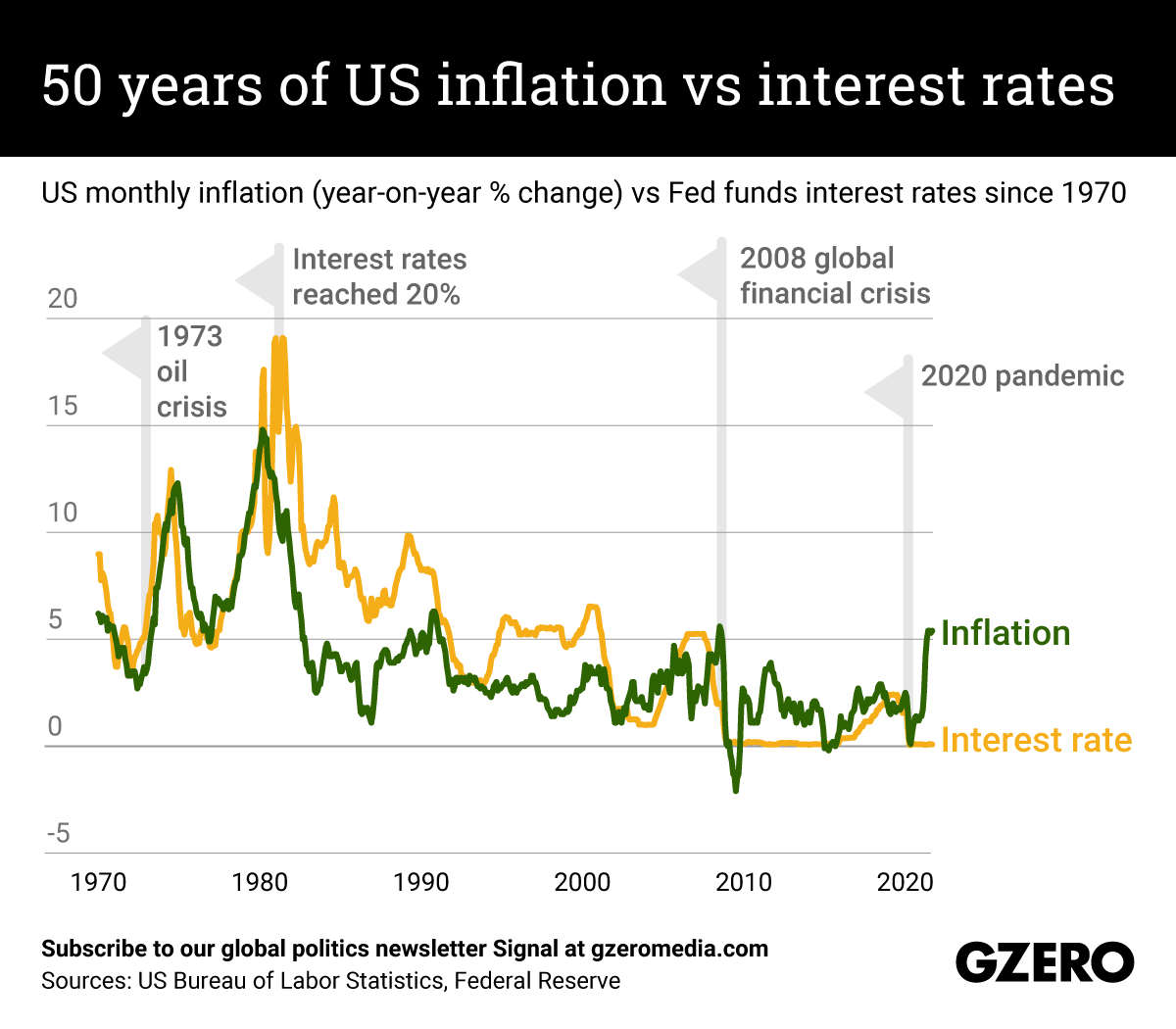October 14, 2021
Inflation in the US remains at its highest monthly level since the 2008 financial crisis. Right now most economists agree that rising prices are being driven by pandemic-related supply chain disruptions, which the government can do little about. This has given some oxygen to supporters of the Biden administration's big-spending agenda, who now insist that inflation will ease up once supply chain disruptions resolve. Deficit hawks, for their part, still say that the Federal Reserve is overheating the US economy by keeping interest rates low because it hopes inflation will be short-lived. We compare US inflation and interest rates over the past half century, a period in which America has suffered double-digit inflation figures more than once.
From Your Site Articles
- Think buying American will help ease inflation? Larry Summers says it won’t - GZERO Media ›
- Inflation nation: What’s driving US prices higher? - GZERO Media ›
- Larry Summers: Rising inflation makes society feel "out of control” - GZERO Media ›
- Biden could get Saudis to push Russia out of OPEC+ - GZERO Media ›
- Are we in a recession? - GZERO Media ›
- How bad is inflation in the US and around the world? - GZERO Media ›
- Podcast: Making sense of global inflation, looming recession, & economists who disagree - GZERO Media ›
- S3 Episode 3: Will there be a recession? - GZERO Media ›
- Biden sticks with Powell as Fed Chair amid rising inflation - GZERO Media ›
- What we need to know to fix US inflation - GZERO Media ›
- When high inflation meets high job rates - GZERO Media ›
- Inflation panicking is 1970s hangover, says economic historian Adam Tooze - GZERO Media ›
More For You
Last week, Microsoft announced it had surpassed its goal of expanding internet access to 250 million people worldwide, reaching more than 299 million, including over 124 million across Africa. The milestone underscores how connectivity is becoming a foundation for economic participation and geopolitical competitiveness in the AI era. Microsoft is evolving its approach to digital access to focus not only on coverage, but on adoption, enablement, and long-term participation in the AI economy, including a new collaboration with Starlink aimed at reaching rural and hard‑to‑reach communities. Read the blog to learn more.
Most Popular
Iranian pro-government protesters wave national flags while participating in an anti-war protest gathering against the U.S. and Israeli military attacks in Iran, in Tehran, Iran, on February 28, 2026.
Photo by Morteza Nikoubazl/NurPhoto
The US and Israel struck several sites in coordinated attacks across Iran this morning. The total number of casualties across Iran is also unknown, though one of the missiles hit a girls’ school in Iran, reportedly killing 53 people.
- YouTube
The United States and Israel have launched massive military strikes on Iran. The stated goal: dismantle Iran’s nuclear program and ballistic missile capabilities. The unstated but increasingly clear objective: regime change. In this Quick Take, Ian Bremmer breaks down what this means.
The US and Israel have launched a series of strikes against Iran at a moment when the Islamic Regime is at its weakest. Ian Bremmer spoke with Iran expert Karim Sadjadpour in Munich earlier this month to understand the choices the regime and population are facing.
© 2025 GZERO Media. All Rights Reserved | A Eurasia Group media company.
